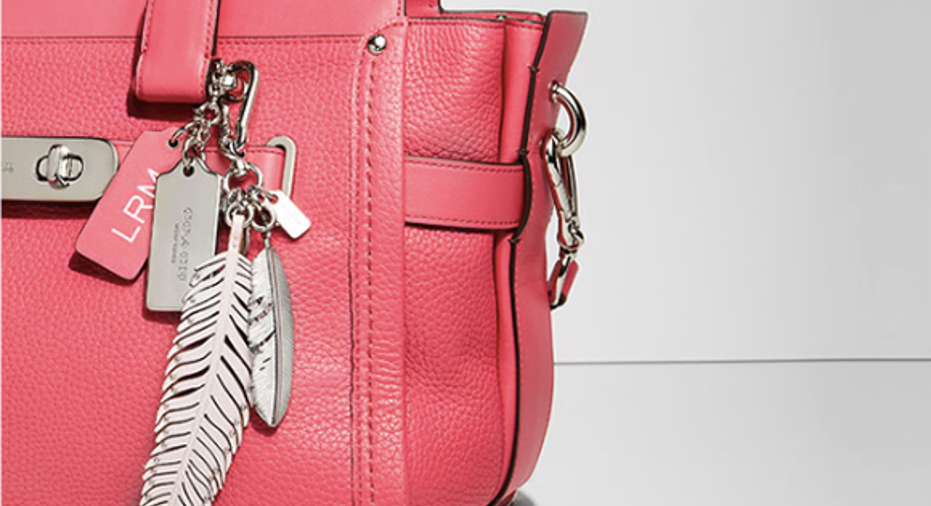Is Coach Inc.'s Dividend Sustainable?

Image source: Coach.
Last month, Coach reported fiscal third-quarter earnings per share of $0.40, a 25% increase from the prior year. The income growth was a positive development for the company. Coach hasn't seen positive year-over-year income growth in three years. In fact, earnings have declined nearly 67% over those three years.
Long-time Investors are able to take some solace in that the fashion retailer has paid out a $0.34-per-share quarterly dividend since mid-2013. Today the company has a very attractive 3.3% dividend yield.
However, since the company decided to maintain its dividend during a period of declining income, Coach has had to pay a higher portion of its earnings to shareholders. Since the company instituted a dividend in 2011, the proportions of earnings being paid out to shareholders has grown to 95.7%.
COH Payout Ratio (TTM) data by YCharts
Forget that a dividend payout ratio near 100% will handcuff any company from investing in its business. A payout that high will leave very little room to pay debtholders or even run daily operations. Fortunately for Coach, the numbers look better if dividends are compared with its free cash flow.
| Metric |
2011 |
2012 |
2013 |
2014 |
2015 |
|---|---|---|---|---|---|
|
Operating cash flow |
$1,033 |
$1,222 |
$1,414 |
$985 |
$937 |
|
Capital expenditures |
($148) |
($184) |
($241) |
($220) |
($199) |
|
Free cash flow (FCF) |
$885 |
$1,037 |
$1,172 |
$766 |
$738 |
|
Dividend |
$178 |
$261 |
$340 |
$377 |
$372 |
|
Dividend-to-FCF ratio |
20% |
25% |
29% |
49% |
50% |
Numbers in millions of U.S. dollars. Source: Company financials
Paying out half the cash the company generates is much more reasonable than when looking at the dividend payout compared to earnings. The reason for the disparity between net income and operating income is mainly the result of depreciation and share-based compensation, which both have a negative impact on earnings but not cash flow.
Unpredictable business
Remaining fashionable and on top of trends is a risk to any retailer. For a luxury retailer such as Coach, it's even more important. At the turn of the decade, the company went from mainly a maker of luxury handbags to a full lifestyle brand that expanded into more lines of businesses including accessories, shoes, and men's bags. The company also went downmarket to appeal to a larger target. Unfortunately, Coach's execution of its new strategy was a disaster, as it turned off a large portion of its consumer base.
Coach showed some improvement in its business this most recent quarter, but there are no guarantees it won't have more blunders in the future. Also, I don't proclaim to be an expert on business cycles, but it's not unreasonable to expect a downturn in the U.S. economy after six years of economic growth. Combined with a struggling global economy, luxury retailers such as Coach will probably feel the pain more than traditional retailers.
Should Coach lower its dividend?
With about $1.3 billion in cash on hand and as a business that generates positive free cash flow, Coach can probably survive another downturn without hacking its dividend. However, the amount of cash and earnings being allocated to a dividend is probably not its best use of funds.
In early 2015, the company announced it was taking on $600 million in debt with intent to use those proceeds for "general corporate purposes, which may include capital expenditures, working capital, repayment of outstanding revolver borrowings, acquisitions, or investments in, and funding for, our Hudson Yards development."
With the company paying nearly $400 million in dividends annually, a large chunk of that debt may have been avoided with a lower dividend payment.
A fickle consumer and an uncertain economy are two reasons you don't typically see specialty retailers as dividend aristocrats. Coach investors can receive a tempting 3.3% dividend yield. However, it's probably not wise to bank on that type of yield going forward. Coach may be an attractive investment for those looking at a turnaround play. However, investors seeking yield should probably steer clear.
The article Is Coach Inc.'s Dividend Sustainable? originally appeared on Fool.com.
Palbir Nijjar has no position in any stocks mentioned. The Motley Fool owns shares of and recommends Coach. Try any of our Foolish newsletter services free for 30 days. We Fools may not all hold the same opinions, but we all believe that considering a diverse range of insights makes us better investors. The Motley Fool has a disclosure policy.
Copyright 1995 - 2016 The Motley Fool, LLC. All rights reserved. The Motley Fool has a disclosure policy.



















